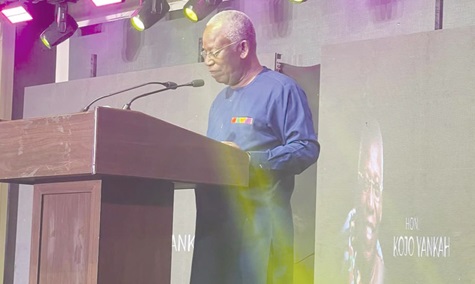
Africa needs more museums — Kojo Yankah
The Founder of the Pan African Heritage Museum, Mr Kojo Yankah, has underscored the need for Africans to put up more museums to help remember their past and preserve their cultural heritage.
He lamented that out of about 55,000 museums spread across the world, the whole of Africa could only boast of about 900, while the United States of America (USA) alone had about 35,000, with about 15,000 in Europe.
“It becomes evident from the figures I have shared with you that Africa needs more museums.
The reason is very simple; if we want to keep our story; if we want to preserve and save our history, we must find a place to keep them and that’s in the museum,” he said.
Mr Yankah, a former Member of Parliament and former Minister of State, was speaking at an event held in Accra last Wednesday to raise funds for the construction of the Pan African World Heritage Museum in Winneba.
Ignorance
Mr Yankah said it was sad that most Africans were ignorant about the most significant parts of their history, culture and even the physical continent because they were never taught or heard it from the perspectives of those who sought to oppress them, making Africans strangers to one another.
“Ghanaians and Nigerians quarrel over jollof but barely know the similarities they have with each other. It is unfortunate that in South Africa there’s xenophobia because the borders that divide us were created without our permission,” he bemoaned.
He added that Africa’s educational system had failed to teach generations about the varieties of minerals and their economic values which made it easy for those who did not have the minerals but had learnt extensively about them to come to the continent and exploit us.
Mr Yankah, who is also a former Editor-in-Chief of the Daily Graphic, stressed that the time had come for Africans to heal themselves of prejudices and xenophobia which were born out of ignorance and segregation.
He said the time had come to disabuse the minds of people of stories of achievements, discoveries and inventions by Africans, adding that the exhibition of the continent’s heroes would go a long way to inspire more Africans to make greater contributions to humanity.
“Nobody will tell our story for us unless we take the trouble to tell it ourselves,” Mr Yankah, founder of the African University College of Communications (AUCC), said.
Project
The six-storey ultramodern structure, sitting on a 10-acre land, is currently under construction with the core vision to curate and tell the story of Africa using African voices, tools and culture.
It will ensure that Ghana and Africa’s rich culture, traditions, customs, innovation, inventions, religion and art are depicted with truthfulness.
When completed, the project would have a rolling terrain covered in greenery to serve as a home to various medicinal plants and herbs.
In addition to the main museum, the complex will also feature a mall, a school, an eatery, among others, to reflect a true museum city.
There will be two versions of the museum: a physical one and a virtual one.
The digital virtual version will be an interactive site modelled on the physical version to give anyone from around the world access to African art, artefacts and commentaries by leading scholars.
And for those who cannot travel but have internet, the virtual version is an opportunity for limitless access.
The event was attended by high- profile personalities from across Africa, including government officials, traditional leaders, diplomats, renowned musicians and cultural figures, among others.
Some notable figures were a former First Lady, Nana Konadu Agyeman-Rawlings; a former President of Botswana, Seretse Khama Ian Khama; Chief Justice Gertrude Torkornoo, Executive Secretary to the President, Nana Bediatuo Asante; President of the Central Regional House of Chiefs, Odeefo Amoakwa Buadu, and daughter of Ghana’s first President, Samia Nkrumah.
